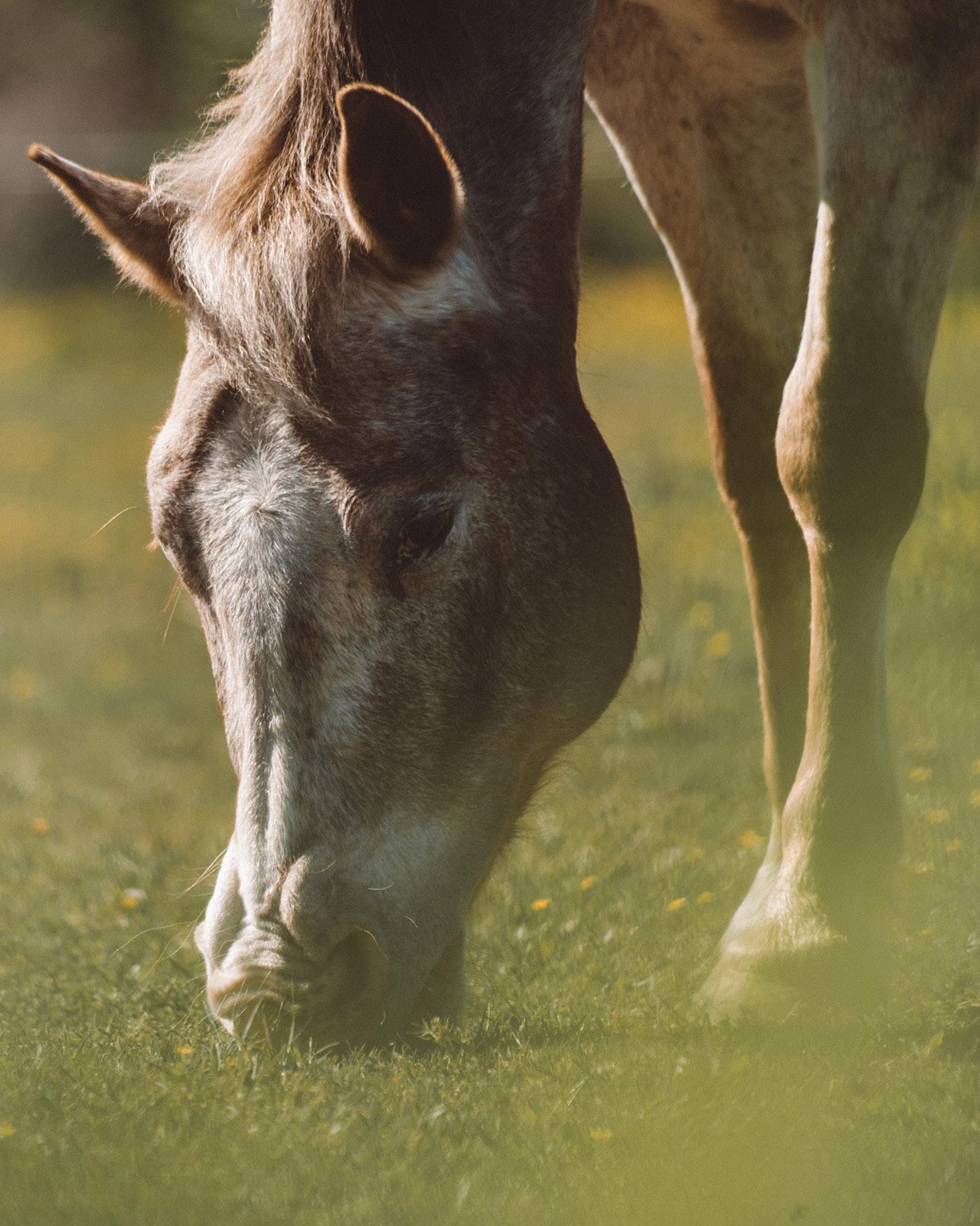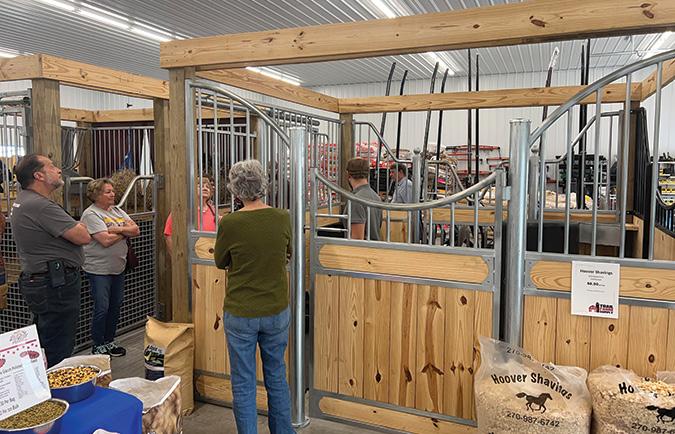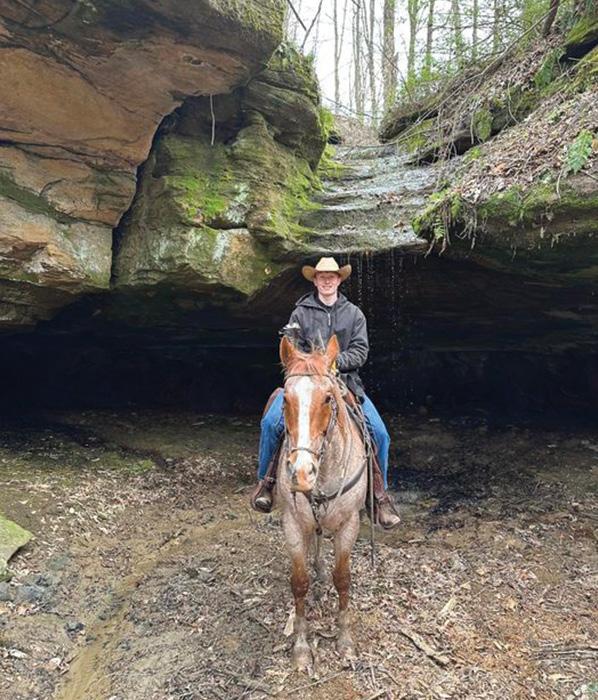
5 minute read
Keeping Horse Pastures Weed Free

by Lisa Kiley
June is usually a prime month for horse owners. The weather is nice, but not too hot, there isn’t as much rain and the pastures have started to dry out from the spring showers. Usually, this month is filled with anticipation for the summer ahead and all the fun things to do with our equine companions. However, just when everything seems right with the world, you may start to notice some bare patches in the field and some unwelcome guest showing up—weeds. While a weed is simply a wild plant growing where it is unwanted, there are some weeds that really wreak havoc on pastures. Here are some tips to help keep pastures weed free that you can implement all year long.
The first step in the war on weeds is to understand your opponent. This means familiarizing yourself with what plants might be hazardous to your horses. Fortunately, there are many resources that can be accessed online and there are also plant identification apps that allow you to snap a photo of the plant in question to determine if it is safe or needs to be removed. Getting out and walking pastures is a great way to familiarize yourself with the species that are growing on your farm. Taking the time to examine pastures before allowing horses to be turned out can be the difference between safe grazing and a hefty vet bill or even death from a poisonous plant.
In cases where there are toxic plants that pose a real risk for your animals, hand removal may be the best option. Of course, hand removal is only effective when the weeds are larger and when they are not prevalent. It is a good option for the most dangerous offenders when it comes to poisonous plants. Hand removal allows you to get the whole plant with roots and prevent re-growth and works best in smaller pastures and paddocks.
Mowing and maintaining pastures is another way to help keep weeds at bay. Mowing in most cases is only a means of helping to control weeds rather than a solution for preventing or eliminating them. While it is recommended to mow pastures down to six inches for maintenance, this will typically only cut down weeds that grow tall and help prevent them from going to seed. If you cut down to about two inches, it may effectively cut weeds to prevent them going to seed, but it may also impede the growth of grass which may not be able to thrive at that length which can allow for an increase of weeds. Strategic mowing is important for healthy pastures, but it is not necessarily enough when it comes to weed control.
If your pasture has been overrun with weeds and hand pulling is not an option, it might be time to think about using herbicide on the pastures to help eradicate the weed population. It is important to get the right type of herbicide and follow the instructions carefully to make sure that you are targeting the weeds you want to remove and applying it at the correct time of year for those plants. There are different weeds that can be treated in the spring, summer, and fall. To make the correct selection for your pasture, it is a good idea to consult with your local extension agency to select the right product. They can also help with other concerns including keeping animals safe and protecting waterways.
If in addition to weeds, there is limited grass growing, or the grass growth has been impeded by the weeds, overseeding may be an option. This is done by putting down grass seed over existing areas where grass already had been growing to fill out the space and encourage more healthy growth. Overseeding is typically done in the spring or early fall. Prior to applying seed, the pasture should be mowed short which will allow for the new seedlings to get the space they need and not be overshadowed by taller grasses. Overseeding can be done in conjunction with the use of herbicide, but the timing has to be right because the herbicide could damage the growth of the seeds if it is applied too soon after seeds have been sown. This is another area where consulting your local extension office can be really helpful, they can help determine what seeds are best for the geographical area and even help with soil samples to determine if any additional nutrients are needed to promote healthy growth. www.cashmans.com
When it comes to grazing, using smart, rotational strategies can be just as helpful when it comes to preventing the growth of weeds in a pasture. Horses are selective eaters and will eat the best first and eat it down to the roots. This can cause the grass to be stunted in growth allowing for weeds to take over. This can happen surprisingly quickly. To prevent this, don’t allow horses to over graze in one area, instead, divide pastures and rotate horses through. This allows pastures to rest and regrow without being stressed through the grazing process. Managing pastures will allow for your horse to have more healthy nourishment from the grass as well.
If you have more questions about how to easily install rotational grazing pastures on your farm, give the team at Cashmans a call and they can help you find the solution that will work best for you and your horses or check out cashmans.com for fencing supplies and get a free estimate with our fencing calculator.
Lisa Kiley is a lifelong horse enthusiast who has worked in the equine industry and shown horses for many years. She is a proud member of the Cashmans Horse Equipment Team. Cashmans Horse Equipment, located in Delaware, Ohio, has been providing top quality products to the equine and agricultural community for 40 years. They have a commitment to sourcing environmentally conscious merchandise and items made in the U.S.A. Cashmans strives to educate customers and provide products that put safety first so you can enjoy more time with the horses you love.



DISCLAIMER: The Horsemen’s Corral has made every effort to ensure the accuracy and reliability of the information provided on this calendar of events. However, the information is provided “as is” without warranty of any kind. The Corral does not accept any responsibility or liability for the accuracy, content, completeness, legality, or reliability of the information contained herein. Where possible, event contact information is provided. Please “Call before you haul”.
JUNE 2023
JUNE 2 — Ranch Riding Clinic with Mike Schmidt, 3-8 p.m., Creek Side Horse Park, 7369 Mottice Dr. SE, Waynesburg, OH. FMI: Cynthia, 330-323-3559, www. creeksidehorsepark.com
JUNE 2-4 — Central Ohio Reining Horse Association Flag City Series, University of Findlay, 14700 US Rt. 68, Findlay, OH. FMI: Todd Knerr, 614-778-5132, taknerr@att. net, www.centralohioreining.com
JUNE 2-4 — Ranch Horse Association of Kentucky Show, Lakeside Arena, 1385 Duncan Rd., Frankfort, KY. FMI: https://www.facebook.com/profile. php?id=100075521394201
JUNE 3 — Premier Mount N Trail Obstacle Competition 2023 Series, Pine Creek Horseman’s Camp, 23937 Big Pine Rd., South Bloomingville, OH. FMI: premiermountntrail@gmail.com, www. premiermountntrail.com
JUNE 3 — 1-Day Ranch Clinic (no cattle), Terry Myers Training Center, 4170 Stover Rd., Ostrander, OH. FMI: 740-666-1162, www.TMTrainingCenter.com
JUNE 3 — Defiance County OHC Just For Fun Show, 9 a.m., Paulding County Fairgrounds, Paulding, OH. FMI: Kate Limber, 419-956-8115
JUNE 3 — Brookfield Saddle Club Fun Show, 696 Bedford Rd. SE, Brookfield, OH. FMI: brookfieldsaddleclub@yahoo.com
JUNE 3 — Ohio Foundation Quarter Horse Association Show, Guernsey County Fairgrounds, 335 Old National Rd., Lore City, OH. FMI: 740-877-7993, ofqhashows@ gmail.com, www.ohfqha.com
JUNE 3 — Columbiana County Saddle Horse Contest Show, 10 a.m., Columbiana County Fairgrounds, 225 Lee Ave., Lisbon, OH. FMI: Amber May, 330-398-5096
JUNE 3 — Under The Oaks Open Show, Crawford County Fairgrounds, 610 Whetstone St., Bucyrus, OH. FMI: Text Trisha, 419-563-5170
JUNE 3 — Gibsonburg Saddle Club Show, 2 p.m., 961 N. Main St., Gibsonburg, OH. FMI: 419-351-9716, www.facebook.com/ profile.php?id=100064203722805
JUNE 3 — Harry Hughes Speed Series, Harry Hughes Youth Equestrian Center, 5563 Waterville-Swanton Rd., Swanton, OH. FMI: Brandy Dotson, 419-205-2873
JUNE 3 — Davis Ranch Cattle Show, 2 p.m., 385 East US Hwy. 150, Hardinsburg, IN. FMI: Jo Shepherd, 812-972-3365, dave@ daviddavishorsemanship.com
JUNE 3 — Open Fun Show (for riders all ages with 2 years or less show experience), Franklin County Fairgrounds, 7178 Blue Creek Rd., Brookville, IN. FMI: 513-520-8363
JUNE 3-4 — Ranch Riding Competition, Creek Side Horse Park, 7369 Mottice Dr. SE, Waynesburg, OH. FMI: creeksidehorsepark@gmail.com, www. creeksidehorsepark.com










